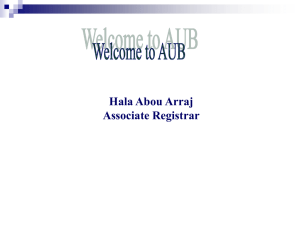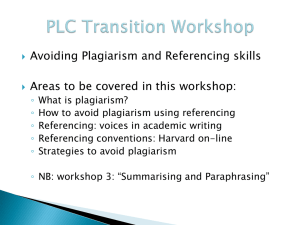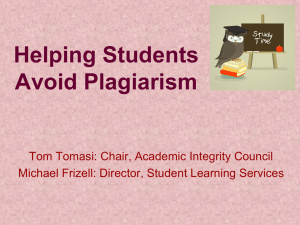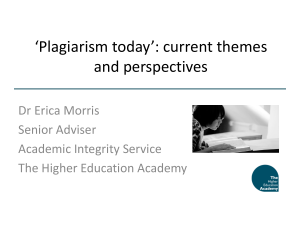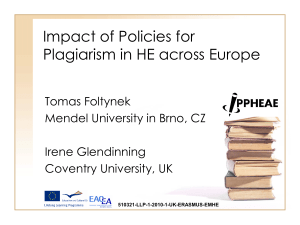PLAGIARISM
advertisement
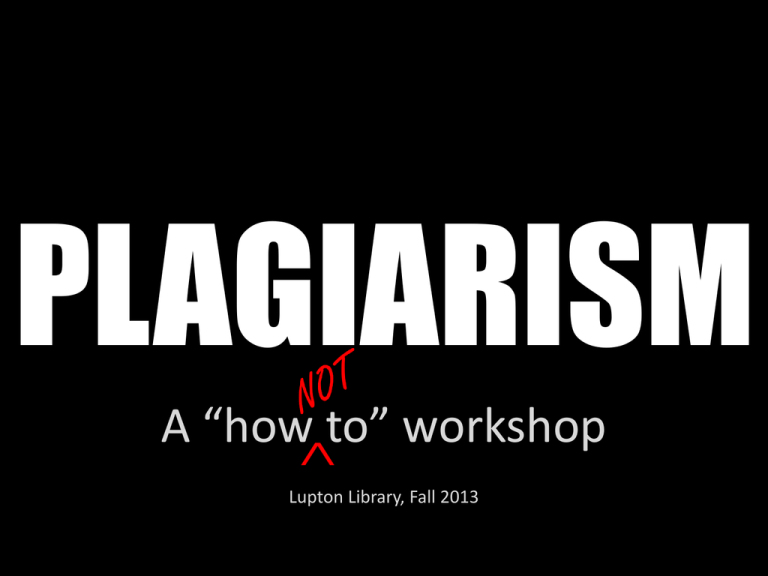
PLAGIARISM A “how to” workshop ^ Lupton Library, Fall 2013 WHAT IS PLAGIARISM? Stealing? WHAT IS PLAGIARISM? Plagiarism is the act of presenting another person’s words, work, or ideas as if they are your own. It’s fraud. Not theft. THE UTC HONOR CODE I pledge that I will neither give nor receive unauthorized aid on any test or assignment. I understand that plagiarism constitutes a serious instance of unauthorized aid. I further pledge that I will exert every effort to insure that the Honor Code is upheld by others and that I will actively support the establishment and continuance of a campus-wide climate of honor and integrity. THE UTC HONOR CODE I pledge that I will neither give nor receive unauthorized aid on any test or assignment. I understand that plagiarism constitutes a serious instance of unauthorized aid. I further pledge that I will exert every effort to insure that the Honor Code is upheld by others and that I will actively support the establishment and continuance of a campus-wide climate of honor and integrity. PENALTIES? The best case? You fail the assignment PENALTIES? The worst case? You fail the course ^ PENALTIES? The REAL worst case? 1st offense: disciplinary probation 2nd offense: suspended from UTC rd 3 offense: expulsion PENALTIES? Those are just the minimum penalties. PENALTIES? Also...UTC will not let you withdraw from a class if an Honor Court hearing is pending. PENALTIES? Why so harsh? What’s the risk? But, really, how is my professor going to find out? What’s the risk? 1. Online plagiarism detection 2. Inappropriate references 3. Language What’s the risk? “My opnion is that we should stop all the freaking out about marijuna and just let people live there lives. The morbidity, mortality, and economic costs to society associated with alcohol and tobacco use in the United States dwarf those associated with marijuana use. So its alcohol and beer and wine that should be outlawed, not marijuna.” Joffe, A., & Yancy, W. S. (2004). Legalization of marijuana: potential impact on youth. Pediatrics, 113(6), e632-e638. What’s the risk? 1. Online plagiarism detection 2. Inappropriate references 3. Language 4. Your professors are experts IS IT PLAGIARISM? Let’s look at several examples IS IT PLAGIARISM? Case #1: Waldo’s book review Did Waldo plagiarize? IS IT PLAGIARISM? Yes. Waldo quoted the book review without acknowledging the original source. IS IT PLAGIARISM? Case #2: The capital of Kyrgyzstan Did Marsha plagiarize? IS IT PLAGIARISM? No. You don’t need to provide a citation for common knowledge. IS IT PLAGIARISM? Common knowledge doesn’t mean that everyone knows it. IS IT PLAGIARISM? Common knowledge refers to stable, well-documented, non-controversial facts about the world. Easy rule: if you could find it in a high school textbook, then it’s probably common knowledge. IS IT PLAGIARISM? Case #3: “My paper; I can do what I want.” Did Bonnie plagiarize? IS IT PLAGIARISM? Yes. Bonnie didn’t copy words, but she did copy ideas. IS IT PLAGIARISM? Case #4: The study partners Did either Lisa or Stephanie plagiarize? IS IT PLAGIARISM? Yes. Any time you present someone else’s ideas as if they were your own, you are plagiarizing. IS IT PLAGIARISM? Case #5: The literature review Did Jane plagiarize? IS IT PLAGIARISM? No. Jane has properly cited the source for the information that she’s using in her paper. AVOIDING PLAGIARISM AVOIDING PLAGIARISM 1. Understand the difference between quoting, summarizing, and paraphrasing. See the Writing Center for help AVOIDING PLAGIARISM 1. Understand the difference between quoting, summarizing, and paraphrasing. 2. Use a consistent citation style. Get a style guide. Visit the Purdue OWL. See the Library for help. AVOIDING PLAGIARISM 1. Understand the difference between quoting, summarizing, and paraphrasing. 2. Use a consistent citation style. 3. Keep track of every source you look at. Notecards, EndNote, etc. AVOIDING PLAGIARISM 1. Understand the difference between quoting, summarizing, and paraphrasing. 2. Use a consistent citation style. 3. Keep track of every source you look at. 4. When in doubt...ask! The Library is here to help! PLAGIARISM A “how to” workshop ^ Lupton Library, Fall 2013
